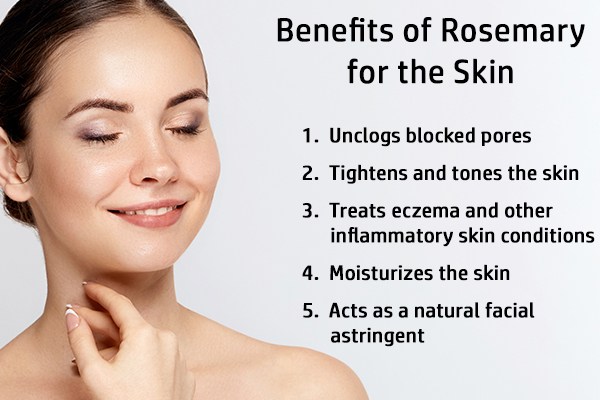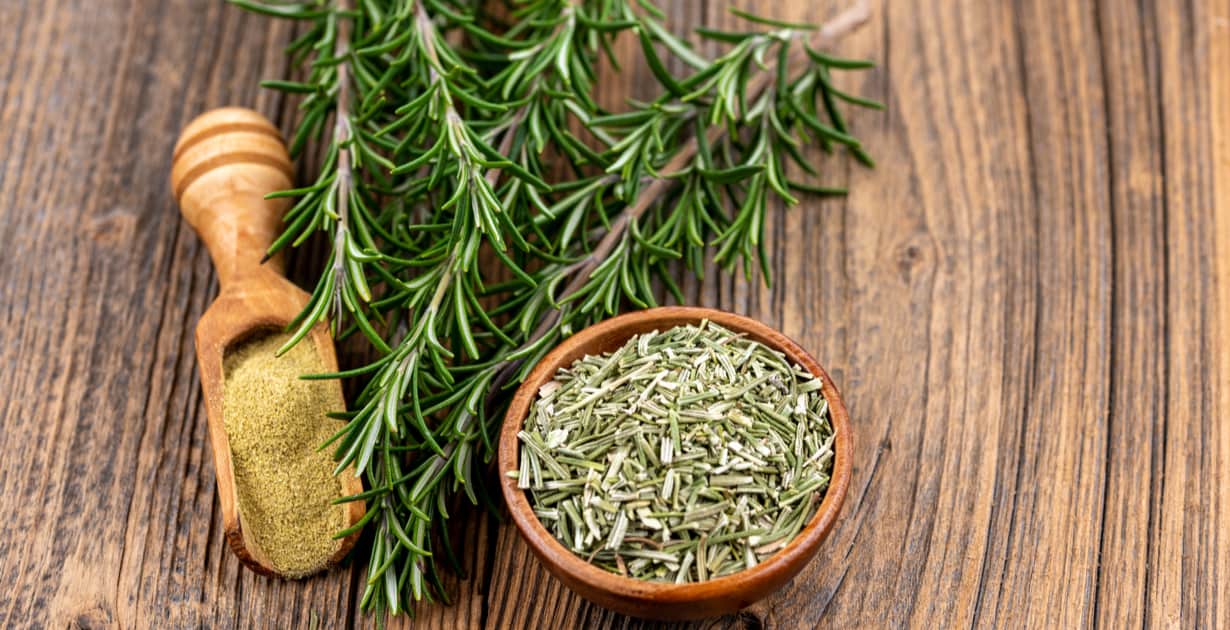Table Of Content

Rosemary extracts have been used for more than 20 years in the food industry as both a flavoring agent and preservative, but it’s possible for some people to experience allergic reactions to rosemary in rare cases. Recent research has shown that whether consumed as an essential oil, tea or seasoning, rosemary benefits can include promoting digestive health, mental clarity, hair and skin health, relaxation and more. So, for an effective health care regime, include rosemary, as it provides the double benefit of encouraging hair growth and preventing hair loss. Ahead, we spoke with board-certified dermatologists and a chemist to determine whether rosemary oil is a legitimate treatment for promoting hair growth. However, Scalpfix can be used as a leave-in treatment to soothe any irritation right away. While it hasn't been studied scientifically for this purpose, there may be a connection between the rosemary water trend and existing evidence that the plant may help with scalp health and hair growth stimulation.
Do you have to dilute rosemary oil for hair?
And oral supplements may have more systemic side effects and interactions with other medications, so it’s especially important to check with your doctor before taking a supplement. There are some reports of allergic reaction to rosemary when taken in high doses. Side effects may include vomiting, spasms, coma, and in some cases, fluid in the lungs.
Side Effects of Using Rosemary Oil
Keep reading to find out, plus shop some of the best rosemary oil hair products—including top hair growth shampoos and scalp treatments approved by experts. Like peppermint essential oil (also used to promote hair growth), rosemary essential oil strengthens circulation. As a result, it could prevent hair follicles from being starved of blood supply, dying off, and leading to hair loss. Rosemary essential oil is considered safe when applied to the scalp or skin after being diluted with a carrier oil. However, it is possible to experience skin irritation or an allergic reaction.
Benefits of Cedarwood Oil for Hair
Most of those calories come from carbohydrate in the form of fiber, but rosemary is not a significant source of carbs, sugar, or fiber. Alternatively, read our article about the top 10 healthy foods for your daily diet. Another study, published in Bioscience, Biotechnology and Biochemistry, concluded that rosemary might be useful as an anti-inflammatory and anti-tumor agent. Some studies have suggested that rosemary may significantly help prevent brain aging.
Squigs Gooseberry Delight Hair Oil
Rosemary oil is concentrated, so only a few drops are needed to create a powerful aromatherapy or topical treatment. Rosemary contains a number of powerful substances, including carnosic acid, carnosol, and rosmarinic acid, which offer anti-inflammatory, antioxidant, and antimicrobial effects. While side effects are rare with topical use, check with your healthcare provider before using the oil topically. Aside from sulfates, you’ll also want to avoid bars with drying alcohols, such as ethanol (Ethyl Alcohol), isopropyl alcohol (isopropanol) and denatured alcohol (SD alcohol), because they’ll remove moisture from your hair. One of my favorite oils, this one has a nozzle tip to easily drip it directly onto my scalp before massaging.
What is the best way to store your shampoo bar?
This scalp scrub is designed to exfoliate the scalp to help with the absorption of the rosemary extract. Rosemary oil can also cause allergic or irritant contact dermatitis, so be on the lookout if you’re noticing anything out of the ordinary going on with your scalp or hair. If you're expecting to wake up the morning after using this oil with noticeable length or fullness, you're bound to be disappointed. "Keep in mind that hair changes in general are slow, and it will take a minimum of three to six months before seeing any noticeable results,” Dr. Penzi adds. For extra scalp stimulation, which is great for hair growth, accompany your rinse with a nice scalp massage. Rosemary oil is an aromatic oil that can be diffused as an aromatherapy treatment or applied to the skin.
Scalp & Hair Oils
Because essential oils are so concentrated, they can easily irritate your skin, leading to flaking, burning, and dryness. Rosemary tea has gained popularity for its believed ability to be an herbal alternative to minoxidil, the conventional drug found in many hair loss treatments and the leading ingredient in hair loss treatments like Rogaine. Rosemary tea has been found to contain many of the same antioxidant and antimicrobial properties as rosemary oil, potentially offering some of the same benefits. Rosemary oil, another byproduct of the rosemary plant, has been found to improve hair growth in specific cases of loss, including forms of alopecia. A comparative study of the effect on hair growth of rosemary oil and minoxidil found "no significant difference was found between the study groups." In fact, both groups showed comparable growth at the six-month trial point.
Is Gnocchi Healthier Than Pasta?
“Rosemary oil can strengthen circulation and improve blood supply to hair follicles, preventing them from being deprived of essential blood supply,” he explains. “Rosemary oil’s anti-inflammatory properties help to reduce scalp irritation, dandruff, and itching, providing a more optimal environment for healthy hair growth,” Majeed adds. Alongside its circulation-boosting and antimicrobial properties, it’s a great ingredient for supercharged hair care.
Rosemary-Infused Hair-Care Products That'll Deeply Soothe & Cleanse Your Scalp

There are no specific number of days you should be oiling your hair, says Dr. Spann, but for most people, once a week is sufficient. “For individuals with severely dry or brittle hair, it may be beneficial to oil two to three times per week,” adds Dr. Spann. There’s a lot of misinformation on the internet, hair oiling can help "protect your hair from damage, improve the look of split ends, and prevent breakage," she says. "It’s especially useful if your hair has been stripped by washing and styling products." This essential oil should not be taken internally, but it is safe for most people to use topically on the skin or to inhale via aromatherapy.
According to Iris Rubin, MD, a board-certified dermatologist and SEEN Skin & Hair Care founder, rosemary oil is purer and, thus, more potent. Extracts typically contain compounds from the plant's leaves and may be combined with a carrier oil. This reduces the concentration of rosemary and makes it less likely to cause irritation. For instance, The Mane Choice Alpha Multi-Vitamin Scalp Growth Oil has carrier oils like jojoba and coconut oil, which help minimize potential sensitivities. Dr. Zayn Majeed, hair surgeon at Harley Street Hair Clinic, tells us that massage application also enhances the absorption of rosemary’s active ingredients into the skin and hair follicles. You’ll find all kinds of rosemary remedies online, from homegrown herb/oil infusions to spiking haircare with essential oil drops.
Rosemary Water and Hair Benefits: What's Possible? - Verywell Health
Rosemary Water and Hair Benefits: What's Possible?.
Posted: Thu, 21 Dec 2023 08:00:00 GMT [source]
Not many, however, know that it can have multiple benefits for your tresses too. According to some scientific evidence, rosemary may benefit nerve tissue. This woody perennial is native to the Mediterranean region, where it’s been used as food and medicine for centuries. If you are a gardener, look into adding this wonderful culinary and medicinal herb into your harvest as it grows easily and yields well. Rosmarinus officinalis, commonly known as rosemary, belongs to the Labiatae or Lamiaceae family of plants, which also includes mint, lemon balm, salvia, marjoram, and oregano.
Ahead, learn everything you need to know about using rosemary oil for hair growth, including how to use it and its potential side effects. For example, applying rosemary oil to your skin could lead to skin irritation in sensitive individuals. Rosemary oil has been shown to stimulate hair growth in certain populations, including in people with androgenic alopecia, a type of hair loss also known as male pattern baldness in men and female pattern baldness in women. Rosemary is a potent source of plant compounds that offer a variety of health benefits.


No comments:
Post a Comment